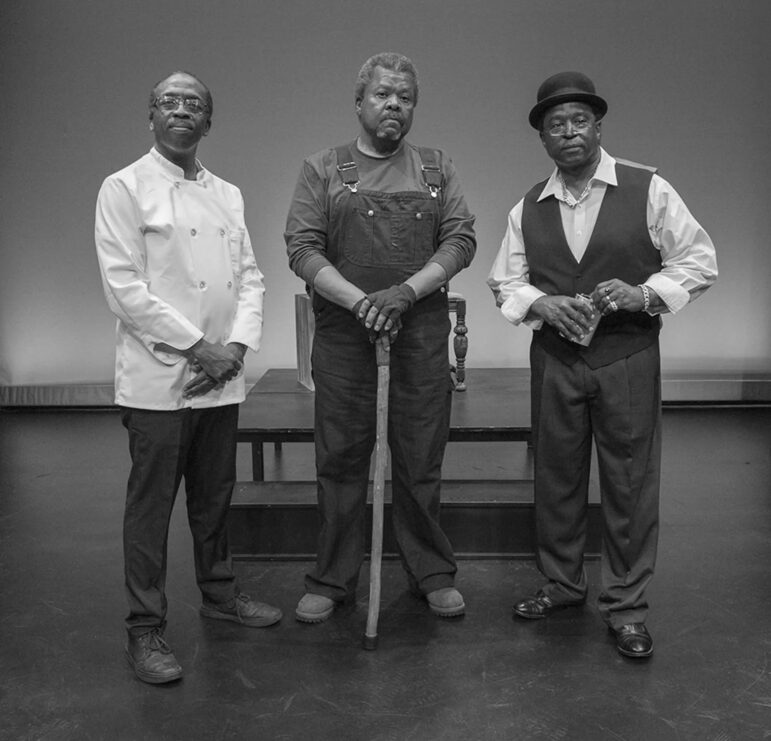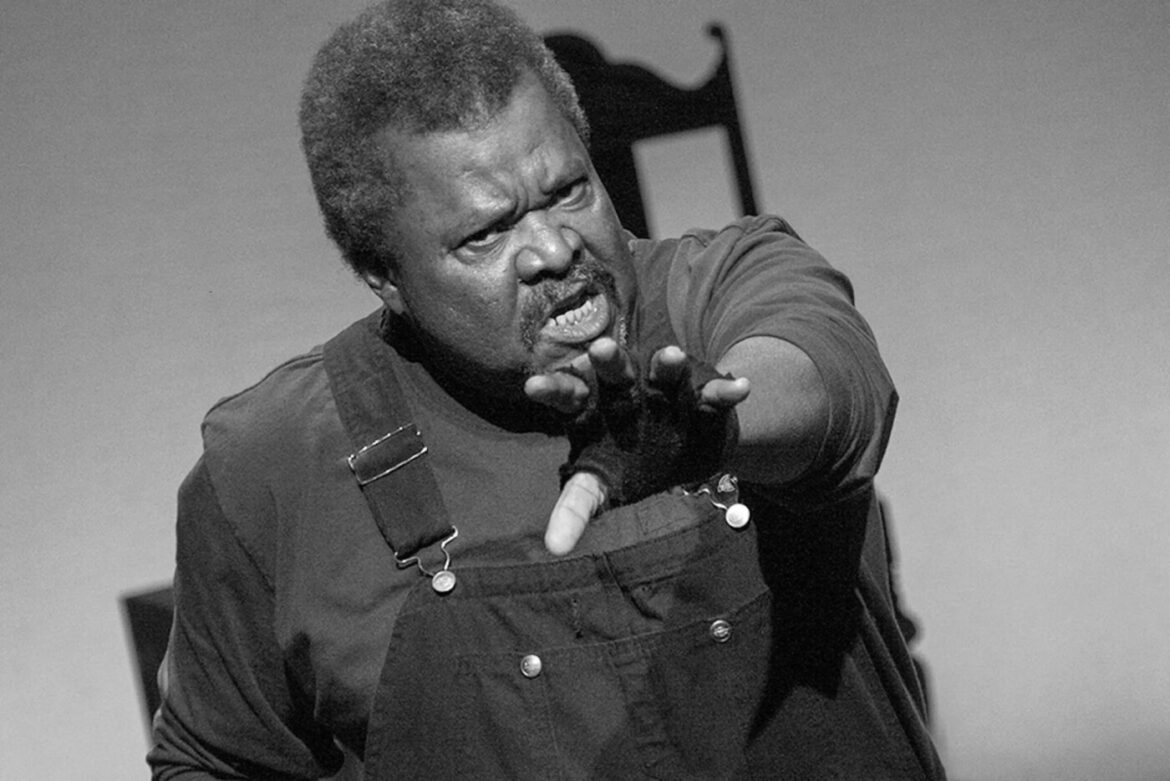For writer-performer Wayne Harris, connecting the past with the present isn’t a bug found in his work, it’s a feature. It informs plays like his jazz-era drama “Jockamo” and helped bring his acclaimed solo show “The Letter: Martin Luther King at the Crossroads” to a Middle Eastern audience of Israeli and Palestinian patrons. Harris frequently combines his experience as an educator with his skills as a performer to highlight chapters of Black history both well-known and not.
This modus operandi and his father’s time as a train dining porter inspired “Train Stories,” opening Sept. 8 at The Marsh in Berkeley. Set during the segregated U.S. of the 1950s, the play tells the stories of three Black men with connections to the country’s railroad expansion. The trio — one is the mythical John Henry — makes invaluable contributions to the country’s train system even as the men themselves aren’t allowed to partake in its luxuries. The three (played by Harris, Tony Cyprien, and Kirk Waller) attempt to reconcile the importance of their work on behalf of a country where the threat of lynching is ever present.
As he continues to refine his three-man show (a rarity for The Marsh, where he frequently has taught), I asked him about his personal connection to the material and how Black America once again stands at an historical crossroads.
The history of Black Americans and the nation’s railroads is comprehensive — from the legend of John Henry to the future Malcolm X working as a server alongside the future Redd Foxx. Why did you feel now was the right time to tell some of their stories onstage?
Wayne Harris: My first play “Mother’s Milk” was predominately about my mother. My initial thought was to explore my father’s story for my next play; however, the truth of the matter is, I did not know my father. He left us when I was around 7 years old and the only thing I knew about him was that he worked on the railroad. I had been told that he was a dining room porter, so when I started doing the research for “Train Stories,” I became fascinated with the characters and histories I was encountering. I was also intrigued by the era of the late ’40s and the impact of the continued Black migration to the north. The stories of the African diaspora are wide and varied, and what started as a story about my father revealed itself as a story about the disconnect of Africans in America from our heritage and our families.
Why a three-man show rather than The Marsh’s usual solo?
The original version of “Train Stories” was a solo performance where I portrayed all three roles—which was quite a challenge for me. It did well in an extended run at the Marsh in 2003. It was an amazing experience, but I always wondered what it would be like as an ensemble piece and how to present a play that is predominantly told as monologues.

Were co-stars Kirk Waller and Tony Cyprien part of the developmental process or did they just seem right for the roles later on?
Neither Kirk nor Tony were involved in the early development of “Train Stories.” The play was originally developed with David Ford and Club Solo (a perpetual workshop I’ve been a part of since the late ’90s). However, both Tony and Kirk have been very instrumental in adapting the play for three voices and have done a wonderful job of making the characters of John and Tyrone their own.
Does this feel like new territory for you or would you say it’s evolved out of the work you’ve been doing already?
Absolutely! The majority of my work has been biographical. “Train Stories” is only my second fictional piece and the first ensemble play I have directed. On top of that, I am playing one of the roles. A glutton for punishment, I guess.
Do you have a personal connection or direct memories tied to Black folks on trains?
As I mentioned before, my father was a dining room porter. However, one of my clearest memories of my childhood was taking the train from St. Louis to Oakland…by myself! Looking back on it now, my father had obviously told the porters on the train that I was his son… I was treated like a king for the entire trip! I even got a chance to go to the porter’s car and hang out. I have loved trains ever since.
The play is set during the post-World War II/pre-Civil Rights Movement era of 1948. Why did that particular time period draw your focus?
It was such a dynamic period for Blacks in America: Many Black folks transitioning from a rural mindset to that of urban realities, early litigation for civil rights, new educational opportunities and a political shift from Republicans to Democrats.
The country is in such a state that one of the top Republican candidates is openly running on a baseless platform insisting that Black people benefited from slavery. Are we moving backwards in terms of civil rights or are people just now realizing that we’ve barely moved at all?
I heard a phrase the other day that says it for me. “We’ve come so far…yet, here we are.” To answer your question, I think that it is more the realization that in the process of many of us applauding gains in legislation, political successes and impacts on the cultural landscape, we turned a blind eye to a substantial amount of America still driven by fear, greed and ignorance. I believe that has all been exasperated by the election of both Barak Obama and Donald Trump figuratively and literally ripping off the Band-Aid.
On a similar note: What do you feel is missing most in discussions of Black history?
There are so many aspects to the ramifications of slavery and the deconstruction of the Black family in America. I feel that there is a need to track that cause and effect through the smaller more personal stories that feed into the larger landscape.
The play specifically focuses on the manual work involved in transportation, but is debuting at a time when transport is becoming more and more automated. Do you think trains still serve an important role in how we travel the world?
There’s no doubt that trains these days are more valued as transporters of things than people. However, I recently traveled on the Capital Corridor from Washington D.C. to New York, and it was fabulous! The whole experience was somehow comforting for me— from the ticket booth to the benches out on the station platform and the conductor calling out stops and punching tickets. While an expansion of “bullet trains” will keep the passenger trains happening from an ecological sense, I hope there will always be the “old school” experience as well.
Though the pandemic isn’t over, several recentarticles have painted a rather grim portrait of the current state of American theater. Is that what you see when you look around the local scene? If so, what do you see as the most pressing areas in need of improvement?
It has been devastating to watch several vital and important stages in the Bay Area close, and there have been many contributing factors—from rising costs to spending all of the government assistance funds that kept many theaters afloat at the height of the pandemic; smaller audiences than the pre-pandemic levels; and a byproduct of shifting lifestyles (i.e. less commuting, more streaming). It is a real crisis and needs to be recognized as such. Maintaining a strong and vibrant theater scene is vital, and funding for nonprofits, community and regional theaters needs to become a priority for government. In addition, this difficult time can be a catalyst for looking at new ways to both bring back our former theater patrons as well as open up to and reach out for a more diverse audience. How do we expand more into audiences of color, younger people?
After the murder of George Floyd, there were some very prominent calls for theater to address is its own racist past and then-current lack of diversity (particularly on an executive level). Have you personally seen any of those improvements made?
I have seen efforts with both Bay Area and national theaters to address the lack of diversity in the theater. As far as my personal experience with both The Marsh and Berkeley Rep, I am encouraged by the efforts of leadership to ask the important questions. There is much work to be done.
Given that the play covers such a specific point in history, whom would you ideally love to see it?
Everybody ages 16 and over. Though this story is specifically by and about three Black men, its themes—which include fatherhood and the extended family—are very universal. In particular, I would love to see young Black men come to the theater to hear these stories and be inspired to tell their own.
Considering the current era, what story do you think needs to be told and recognized for its historical significance right now?
The undermining of voting rights! It’s an insidious, orchestrated attempt to take the rights of voting from marginal communities that are most in need of empowerment.
What’s next for you?
Back to my roots of biographical one-man storytelling with “Liner Notes,” which is about my love of musical theater at the age of 10 in a neighborhood that was partial to The Temptations and the Supremes.
“Train Stories” is at 7:30 p.m. Fridays from Sept. 8- 29 at The Marsh Berkeley, 2120 Allston Way, Berkeley. Tickets are $25 to $100 at https://themarsh.org/shows_and_events/marshstream/train-stories/
